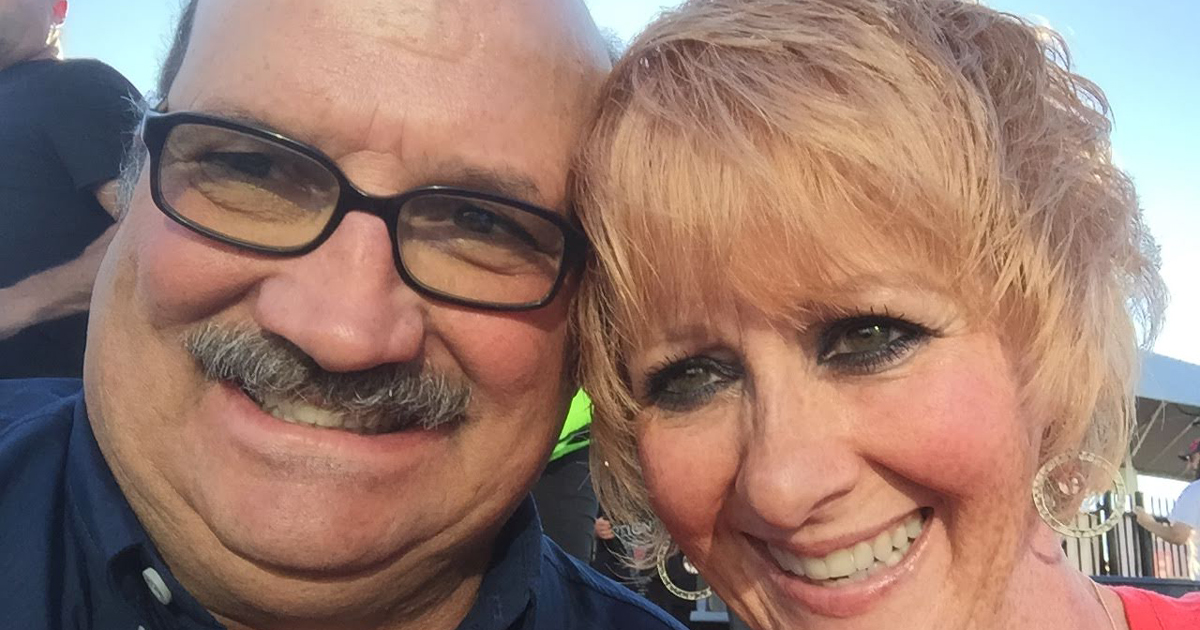A 26-mile walk to conquer cancer

Mike Hadfield recently completed the first marathon of his life. And it happened while he was recovering from cancer in the halls of the Fred & Pamela Buffett Cancer Center.
"My doctors encouraged me to start walking the day after surgery," says the 60-year-old Hadfield. "They said it would help me recover faster and prevent the development of pneumonia. Some patients had even walked a half marathon and full marathon."
That's all Hadfield had to hear. "I made it my goal to walk a full marathon before I left the hospital," he says. "Finding out I had cancer was a very eye-opening experience. This was an incentive for me to get healthier."
It was the fall of 2019 when Hadfield got the news that he had cancer. He had been having trouble swallowing. Then he developed a nagging cough that wouldn't go away. Something wasn't right. He decided to see his doctor in Harlan, Iowa, who recommended he have an endoscopy of his esophagus and upper gastrointestinal tract. A tumor was found, and the results of a biopsy confirmed it was cancer. His doctor referred him to Nebraska Medicine oncologist Jean Grem, MD, who confirmed he had esophageal cancer.
"Mike had a type of esophageal cancer that is associated with acid reflux," says Dr. Grem. "Because it was found in stage 2 and it hadn't spread, Mike's outlook was good."
"When I first met Dr. Grem, I was very impressed," says Hadfield. "I could immediately tell how intelligent she was, which made me feel really good and comfortable right off the bat. I knew we were in good hands."
Dr. Grem recommended Hadfield undergo a regimen of chemotherapy and surgery. Because his tumor was located at the transition point where the esophagus meets the stomach, surgical removal of sections of each would be required in a joint surgery performed by Nebraska Medicine surgical oncologist Quan Ly, MD, an expert in abdominal and thoracic cancer, and Nebraska Medicine thoracic and cardiac surgeon David Berkheim, MD, who would dissect the cancer in the chest area.
"All of my doctor visits and chemotherapy treatments were scheduled for me and went very smoothly," says Hadfield. "We asked a lot of questions and they answered them all. I was very impressed and comfortable at how well the team worked together."
"Mike's treatment and care was very much a coordinated effort," says Dr. Ly. "His case was discussed at our tumor board meetings before and after surgery to get input from various disciplines including surgery, medical oncology, pathology, radiology, radiation oncology and genetics. We then worked together as a team to plan his treatments based on his tumor staging. The timing of his treatments was very important, and that's where good communication between the members of his care team is critical."
"A multidisciplinary approach is optimal for management of esophageal cancer," agrees Dr. Grem. "The members of the team rely on each other to provide the best care for each patient."
Hadfield received a regimen of eight chemotherapy treatments at the Fred & Pamela Buffett Cancer Center over four months, which was followed by surgery about five weeks later.
"Mike responded very well to treatment," says Dr. Ly. "He had a complete pathological response – the best we could ask for."
The day after surgery, Hadfield was mobile and had begun his mission to complete a marathon.
I had started walking about 10,000 steps a day several weeks before surgery, as Dr. Grem said this would help me get stronger and recover more quickly," says Hadfield. "It was a little difficult to start walking again right after surgery, but I just kept at it and walked a little bit longer each day. Before I knew it, I was up to a mile or more."
Over the next four weeks, Hadfield became a regular presence in the halls of the medical-surgical unit. His positive attitude and happy demeanor inspired other patients and brought smiles to staff.
"Mike was one of the most optimistic and outgoing patients I've ever had," says Dr. Ly. "For a lot of patients, we really have to push to get them mobile and walk. But with Mike, we never had to nudge him along. He just walked and walked and walked. When I would come to visit him, I usually found him in the hallways walking. It was inspirational to see. He was always in such good spirits, he made us all feel happy."
"Mike's positive attitude was extremely important in allowing him to get through the chemotherapy and surgery," says Dr. Grem. "The loving support of his wife and family was also crucial."
Hadfield says he couldn't have asked for better care. "Everyone was really there for us," recalls Hadfield. "They made sure my family and I were OK physically and emotionally. Dr. Ly was always so bubbly and smiling and so patient with us when we had questions. We always felt like we were getting the best care possible."
Hadfield paced his marathon perfectly. On the day he was scheduled to be discharged, he also completed his last few laps to finish his marathon. The staff placed tape across the hallway and cheered Mike Hadfield and his wife, Paula "Hadfield on as he crossed the finish line. "It was a good day," recalls Hadfield. "I had not only completed the marathon but I had also conquered cancer."




